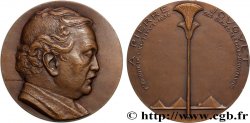fme_937863 - III REPUBLIC Plaquette, Comité des Expositions à l’étranger
90.00 €(Approx. 93.60$ | 74.70£)
Quantity
Add to your cart

Type : Plaquette, Comité des Expositions à l’étranger
Date: 1899
Metal : bronze
Diameter : 63,5 mm
Orientation dies : 12 h.
Engraver BOTTÉE Louis-Alexandre (1852-1940)
Weight : 49,44 g.
Edge : lisse + Corne BRONZE
Puncheon : corne BRONZE
Obverse
Obverse legend : ANÉPIGRAPHE.
Obverse description : Femme assise drapée avec des ailes dans les cheveux et une corne d’abondance à ses pieds. Signé : L. BOTTEE. 99.
Reverse
Reverse legend : COMITÉ / FRANÇAIS / DES / EXPOSITIONS / A / L’ÉTRANGER // ALB COLAS.
Reverse description : Arbre avec à ses pieds un marteau, une enclume, deux serpents et un chardon.
Commentary
Médaille décernée à Alb. Colas.
Dimensions : 62,5*42 mm
Le Comité français des expositions et conventions est reconnu d'utilité publique en 1900 et a fusionné le 10 juin 1925 avec le "Comité national des expositions coloniales.
Louis-Alexandre Bottée, né le 14 mars 1852 à Paris où il est mort le 14 novembre 1940, est un graveur en médailles français. Il fait son apprentissage dès l'âge de 13 ans dans une fabrique de boutons où il est chargé de la gravure des modèles. Élève à l'École des arts décoratifs, il entre à l'atelier de Paulin Tasset en 1869. Reçu en 1871 à l'École nationale supérieure des beaux-arts, il obtient, en 1878, le premier grand Prix de Rome de gravure en médailles. Il est médaille d'or du Salon en 1900. Officier de la Légion d'honneur en 1903. Il est élu membre de l'Académie des beaux-arts en 1930....
Dimensions : 62,5*42 mm
Le Comité français des expositions et conventions est reconnu d'utilité publique en 1900 et a fusionné le 10 juin 1925 avec le "Comité national des expositions coloniales.
Louis-Alexandre Bottée, né le 14 mars 1852 à Paris où il est mort le 14 novembre 1940, est un graveur en médailles français. Il fait son apprentissage dès l'âge de 13 ans dans une fabrique de boutons où il est chargé de la gravure des modèles. Élève à l'École des arts décoratifs, il entre à l'atelier de Paulin Tasset en 1869. Reçu en 1871 à l'École nationale supérieure des beaux-arts, il obtient, en 1878, le premier grand Prix de Rome de gravure en médailles. Il est médaille d'or du Salon en 1900. Officier de la Légion d'honneur en 1903. Il est élu membre de l'Académie des beaux-arts en 1930....








 Report a mistake
Report a mistake Print the page
Print the page Share my selection
Share my selection Ask a question
Ask a question Consign / sell
Consign / sell
 Full data
Full data









